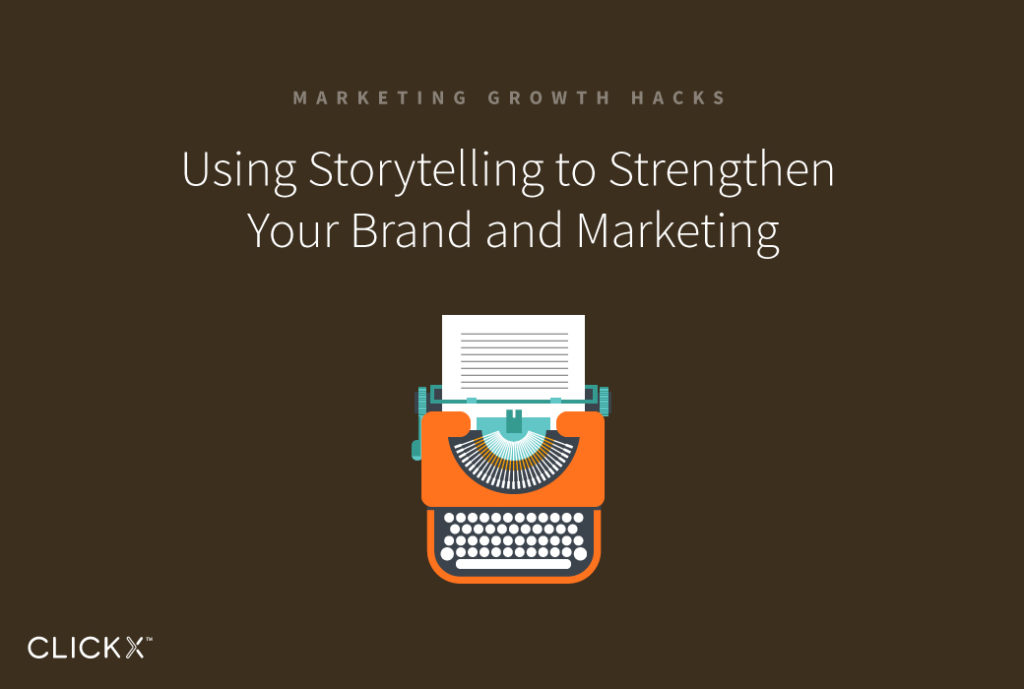Using Storytelling to Strengthen Your Brand and Marketing
One of the best ways to enhance your brand is through powerful storytelling. You can easily make your products and services stand out with stories that convey the positive effect your company has had on others. You can share an adventure to your target audience that they can relate to, and encourage them to turn to you over your competitors. Creative stories that communicate your company philosophy to your audience in an emotional way can ultimately help them develop a personal connection with your brand.
Here’s how you can use storytelling to charm current and prospective customers.

Storytelling Basics
Stories are an infinitely more engaging way to convey your brand’s message. Most people’s lives are largely affected by stories instead of other forms of teaching, helping us gain knowledge and learn lessons through a creative means that encourages our imaginations.
You’re much more likely to recall a compelling story and the subsequent message you extracted from it than a bland lecture that only serves to inform instead of inspire. This also makes sense because of the fact that we are naturally social, usually using language as the primary means of communication and conveying emotions. Storytelling is the most effective way to use language to affect perceptions and emotions, playing with language in a way that truly attracts an audience.
Companies that want to use storytelling in their marketing and branding efforts should know exactly what type of voice they want to use, what the story should get across, and why the audience should care. The main difference between storytelling and other types of marketing is its combination of subtlety and indirectness. It takes some genuine creativity to help establish a brand while indirectly selling a product or service.
Don’t Simply Invent
Storytelling doesn’t mean the same thing as simply creating a story. Your company should be able to tell many different stories based on past experiences and what you have to offer. You can tell stories about how your company has managed to help customers by providing them with an effective solution to a problem, or use a narrative to convince people to use your products in a relatable story based on the voice of your audience.
If you’re looking for ways to add content to your website, storytelling is a good way to generate ideas for unique blog posts and other types of content, through stories that flesh out the brand narrative. While a lot of content is better served as purely informational, there is always a place for a good story to bring a personal touch to your brand. You should be able to effectively express emotions through experiences that form a full picture of your company.
To make your brand’s storytelling consistently effective and relevant, you need to know how to adapt your stories to appeal to evolving needs of your audience. You can easily involve current company events and campaigns that can help further along your company’s narrative.

Four-Step Storytelling Structure
Most stories consist of three acts, with a beginning, middle and end that effectively establish a situation, bring the conflict to a climax, and conclude with a resolution. Business stories, on the other hand, involve a fourth step: a call to action.
Ultimately, by the end of your story, you want to inspire and encourage your audience to use that call to action to purchase your products or services. Depending on how many people make it to that final step, you can determine how well your story is performing as magnet for the reader, and adjust the narrative accordingly.
How to Decide on the Right Story
Every story should be a personal one about your brand. Consider how the company got started, the motivation behind its creation and the ultimate goal you want to pursue with it. The most important aspect that should take top priority is the audience’s specific needs.
Make sure you keep your stories both factual and engaging. You can accomplish this mainly through focusing on the clients rather than the business. Make customers and prospects the main character—the protagonist—of your stories. Your company should serve as the supporting character that can help them along, navigating the challenges they face in the conquest to accomplish what they want and reach their ideal resolution.
One of the most effective ways to express how your company can help clients is to use extensive customer testimonials. Many companies include one- or two-sentence blurbs about their services, but those are easily forgotten and don’t provide the level of depth that can reassure prospects that you’re what they need. Lengthy testimonials that chronicle the client’s individual life and challenges, along with the ways the company was able to help them solve their problems and reach a satisfactory resolution, can truly draw readers and encourage them to connect.

Finding the Best Medium for Your Story
People can use many different mediums to tell a story, such as film, blogs, social media outlets, and more. They all provide different ways to connecting with an audience, which means the storyteller should customize stories to fit with any given medium. Consider length: Seminars and conferences give storytellers a chance to go in-depth and truly connect with audiences, while people surfing the internet and watching television often prefer shorter and simpler messages.
If you want to be the best storyteller possible, you need to make sure you have a solid understanding of your audience. See the audience reacts to the story and determine how you can continue to develop your story based on those reactions. Stories should seem authentic, emotional, and connectable if you want to drive your audience to perform a desired action.
Through effective storytelling, you can engage the people you want to engage and encourage them to turn to you to help meet their needs.
Have any other tips for storytelling that can connect with an audience? Let us know in the comments.




